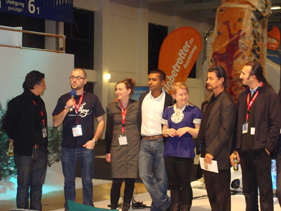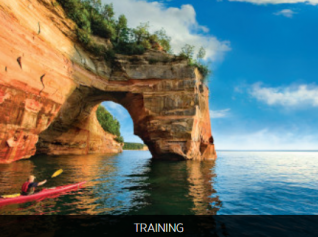ITB responsible tourism roundup

Inspiring stories to warm the heart
ITB Berlin is rather a spiritual home for the Fringe Responsible Tourism
group, not least as the theme of social responsibility runs through the
entire event instead of being segregated to a few sideline activities. Writes Sally Broom of tripbod.com
This is largely thanks to a number of core ITB Team members, including our
own Fringe RT member and friend Rika Jean-Francois who is in charge of CSR at ITB.
Rika helped launched the Fringe RT Networking on the Friday evening of ITB, which was the culmination of a momentous day. Earlier had been the launch of Pocketvillage, the first travel search engine dedicated to helping independent travellers find extraordinary (and responsible) travel experiences.
After this was theunveiling of the VESTAS, an awards scheme ‘for all awards’ in sustainable tourism. Spear-headed by VISION on Sustainable Tourism, destinet.eu and Ecotrans the VESTAS promise to highlight both the best of the best and the worst of the worst in responsible tourism.
It’s unsurprising that after all that excitement a large crowd gathered in hall 4.1 of ITB for some drinks and a chance to catch up with both old and new friends – and many there were too! It was probably our biggest turnout yet for a Fringe RT Networking event, helped not least by some rather special entertainment. At the start of the networking we were treated to a
spectacular performance from the Burundi drumming troupe.
It was Burundi’s first official trade show presence at ITB Berlin this year, which marked a momentous occasion for the country and their developing tourism industry.
I spent a lot of time during the conference at the Burundi stand and could easily see why they won the Best African Stand award. The team on the stand included several impassioned young people, desperate to see their country’s reputation restored as a jewel in the crown of East African and a pioneer in sustainable tourism. The presentation we were treated to by their drummers
alone was enough to convince me that this much misunderstood country deserves consideration by the more explorative and discerning traveller.
As well as our Burundi friends, we were delighted to see many other new faces at the Fringe RT Networking as well as lots of new partnerships being formed. It was especially heartening to realise that, in spite of challenging economic and politic times globally, the grass root, responsible
travel innovators are still working proactively and passionately to create a better and more responsible industry, and have a lot of fun in process.
This year the Responsible Tourism Networking organisers from PocketVillage, Tripod, The Green Circuit, The Blue Yonder, Vision and ITB Berlin invited inspirational stories direct from destinations to kick off this years event.
The top five successful selections that presented their 5 minute story of local inspiration were:
- Andaman Discoveries, Thailand: see below
- Atlas Kasbah Ecolodge, Morocco
- Social Treks, Nepal Far West: see below
- Nutti Sami Siida, Swedish Lapland: see www.nutti.se/
- Blood Foundation, Turkey: see: www.travelmole.com/stories/1147004.php
In addition to presenting their story at the world’s leading travel trade show, selected applicants go in the running to be featured on the freshly launched PocketVillage; an intuitive search engine to find and enjoy exceptional travel experiences.
Kailali Chamber of Commerce and Industry, award winning chamber in Nepal, won because of their innovative approaches towards tourism promotion in this far west district of Nepal, ravaged by about two decades of insurgency, but zealous to bounce back.
Social Treks, Nepal Far West
The Far West house the remotest districts in Nepal, and have over the years been deprived of development and attention. They get under 20000 visitors a year, most of them pilgrims and aid workers. Reason, Nepal’s big four – Everest, Annapurna, Langtang and Chitwan take most of the visitors. Just across the border from these districts, in the Indian state of Uttarkhand, over 9 million visitors come every year, almost 80 percent of them Indian pilgrims.
In one inspired move in 2008, the Kailali Chamber of Commerce and Industry, decided to take a lead. They started a campaign called Mission One Paisa (one paisa being the equivalent of less than 1 cent), whereby they rallied all industries, and salaried employees in the district to contribute towards a Tourism Fund to make these districts known to the world. The campaign started with a pledge of 25 paise per notebook sold by a printing house. Within a few months, this house had put Rs. 10,000 into the fund, which started a wave in the district, bringing in Hotels (who put Rs. 50 for each booking), hospital workers giving Rs. 10 per month from their salaries, Doctors giving 50p per prescription written, and other people also joined in including the public, bus ticketing, flour mills, rice mills etc, bringing in a whopping 1 Million Rs into the tourism fund.
Not satisfied with this, the Chamber conducted consumer fairs and added a Corporate Tax to companied to total the fund to over 4 Million Rs, in early 2009. This done, they invited professional photographers and got them to tour the districts, resulting in the publication of 26 different designs of posters, 3 coffee table books and postcards. These were then publicized using the same money in cities such as Kathmandu. Innovation was central. They even got the students in the district write to people they knew outside but ensured that the District postcards were sent.
They printed scratch proof posters and put them in every long distance bus out of the district, so the message can be spread.
They are not stopping at this. They want to reach into the international scene with this “lets make Far West Reknown” drive.
Not the end! They then realized that the airport not being hardtopped could be a problem. Another microfunding campaign, this time including even people like rickshaw pullers upto industrialists led to people putting money as less as Rs. 2 to personal donations of Rs. 55,000, bringing in Rs. 6.1 Million, which was handed over to the government to match.
Eventually the hardtopping of the runaway commenced, and currently Dhangadhi has the second longest runaway in Nepal. They are applying for the status of the airport to be made international.
This is one of the few examples of how effective a Private Public Partnership can be.
At the moment, this campaign has resulted in renewed interest in the Far west and there are trainings going on to develop the industry, including Destination Management, Branding and Tour Operator trainings… the plan is to bring these products to OTM in Calcutta in July 2011 and to SATTE in February 2012.
Many destinations can learn from this approach to development, and involving the whole community in tourism!

Atlas Kasbah Ecolodge, Morocco
An Ecology Festival in the Argan Forest of Morocco
On January 1st 2011, we celebrated the beginning of the International Year of Forests, here in Tighanimine Elbaz, a small village 5km from Agadir in South-Western Morocco. Hopefully, this year, some measures will be taken to save our forest, our heritage and the soul of my people. All Berbers like me, who live in the south-west of the Kingdom, feel the spirit that comes from the Argan forest, one of the world’s most interesting ecosystems. Unesco recognized this unique character in 1998 and declared it ‘Argan Biosphere Reserve’.
My good friend Rachid from the local association N’Aït Maten and I have enjoyed this wonderful resource for a long time. We need to teach others about this great gift and we need to do something before it is too late, But what would be the vehicle to show others what a wonderful resource is on their doorstep?
By mid January, we had come up with a novel idea; stage an Ecology Festival to commemorate the argan forest in our village. Rachid preferred a small event in the village but I wanted something bigger. The only problem was that he has decided to hold the event on February 12th and 13th leaving us only 3 weeks to prepare. We had to think and act quickly; who will be involved, what will they do, how…? Firstly, we needed sponsors, then to prepare a program and then to send out invitations for the closing ceremony.
Working day and night, we were soon joined by more and more people from the community. The local womens’ Argan Oil Cooperative became involved in the organization and old and young people asked to join in. The interest was exceptional and the volunteers attended every meeting…and we had one everyday!!
I asked everybody I knew for sponsorship and the response was excellent. People obviously wanted to protect our argan forest and were looking for a means to express this desire. The Agadir French High School provided us with pupils, stationery and teachers since we planned nature awareness workshops for the children at the Tighanimine school. While they were at school, their parents were hiking in the argan forest. An Agadir University professor offered an interpretation of the biodiversity of the area. In the afternoon, we organized a treasure hunt in the village for teenagers. At the Atlas Kasbah Ecolodge, a local photographer exhibited his work, we opened our pottery workshop and held permaculture demonstrations.
At noon, everybody dined on couscous in the homes of the local residents.
At the end of the day, Berber well-known musicians offered a concert in the village and the closing ceremony was held at the Atlas Kasbah Ecolodge. We inaugurated the first “green house” of Morocco: each family of the village will bring to this house a certain amount of recyclable material and they receive a gift. This was a great idea given to us by a local company that recycles plastic, glass, oil (and with whom we work at the ecolodge)..
Perhaps the highlight of the day was the community clean-up with the help of volunteers and children from the local school, In fact one week before the event we had already gathered enough trash to fill 4 large trucks…. an incredible feat that gained the attention of the media.
By 10pm, on Feb 13th, our feet were hurting and we were exhausted but very pleased with our success! At least 300 people came from Agadir to attend the activities during the day. We still cannot believe that we managed to clean the village and surrounding argan forest with such an enthusiastic community and supporters from across the region.

Andaman Discoveries, Thailand
Hello everybody, my name is Judith Schneider and I am a student at the ICRT Leeds. Before I started the course there last September, I wanted to get to know a ‘best practice example’ in the field of responsible tourism to do an internship for a few months; and found it in Thailand, at Andaman Discoveries.
Bodhi Garrett, the founder of Andaman Discoveries, would have loved to talk to you today himself but he is occupied with receiving the TO DO!-Award (and probably getting spoiled with nice food, drinks and congratulations).
So let me tell you a bit about Andaman Discoveries:
The tsunami 2004 brought a great number of changes for the communities of the Andaman coast. Entire villages were relocated, livelihoods were lost, and, initially, grief and despair were prevalent. Over the last six years, however, many communities have created new opportunities in the wake of their losses.
Since beginning as a relief effort after the tsunami, Andaman Discoveries has evolved into a social enterprise helping communities to move from disaster to sustainable development.
By now, Andaman Discoveries’ on-going projects reach over 3,000 people and include scholarships, forest restoration, handicraft productions, and a community development network. Our programs benefit both the guest and the host – providing real benefit to local people and fascinating insights into a unique way of life for visitors.
We offer four types of programs: Cultural tours with village homestays, handicraft workshops, and outdoor activities; Volunteering with local schools, orphanages, and conservation projects; Study and Service Tours for schools, universities and other groups; and Regional tours to jungle tree-houses and island eco-resorts.
Andaman Discoveries is based in a relatively undeveloped area just north of the resorts of Phuket and Khao Lak – we are surrounded by pristine jungle, untouched beaches and coral reefs; and a harmonious blend of Muslim, Buddhist and Moken communities.
The cultural and natural effects of tourism to the south of us in Phuket are a clear indication of the potential effects of mass tourism in the area where we work. So, before it’s too late, we need to set a good example and help communities build capacity to respond to tourism in their own terms.
Taking a look at our current projects gives you a good idea on how community tourism can become self-sustaining:
Networks for community groups involved in conservation and responsible tourism
Supporting children through scholarships, lunch programs for migrant children, and much more
Conservation and Environmental Education to help protect endangered species and habitats
Supporting women’s groups to produce natural, high quality soaps and tie-dye
Community Resource Centres to link our programs. For example, the new centre in Ban Lion village includes a welcome area for visitors, a study room for children, a store and sewing area for the women’s craft group, and an educational museum about local conservation and village life
These on-going efforts are not simply a checklist; they are a process that long-term dedication and partnership. It takes time to create real benefit and self-reliant community groups.
If done with patience and care, community tourism can allow locals harness the benefits of tourism while avoiding its pitfalls. During my time with Andaman Discoveries, I had the chance to actually get to know quite a few of the people who are profiting from their projects and I was amazed how such a small organisation can make such a positive change in the lives of so many families.
In conclusion, in the name of Andaman Discoveries, I’d like to say that it is an honour to be part of the responsible tourism community, where we can watch new dreams come to life and development come from disaster.
 United Kingdom
United Kingdom United States
United States Asia Pacific
Asia Pacific












































EU airports bring back 100ml liquid rule
British Airways passengers endure 11-hour 'flight to nowhere'
CLIA: Anti-cruise demos could cause itinerary changes in Europe
Co-pilot faints, easyJet flight issues ‘red alert’
Gatwick braces for strike